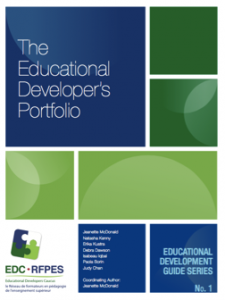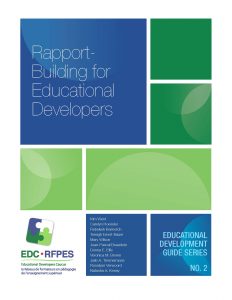Educational Development Guides
What are the Educational Development Guides
The Educational Development Guides are applied resources intended to further evidence-informed, reflective practice in educational development. Focused on a variety of topics ranging from building rapport to portfolios, the Guides re freely accessible and relevant to educational developers worldwide.
Read ED Guides
Available to download
- ED Guide No. 1. The Educational Developer’s Portfolio
- ED Guide No. 2. Rapport-Building for Educational Developers
- ED Guide No. 3. Centre Reviews: Strategies for Success
Selection of Topics and Authors
Calls for Topics
Guide topics are selected by YOU!
A survey is distributed bi-annually. Suggestions are reviewed by STLHE and selected based on the following criteria:
- the topic’s relevance to community’s current needs as well as the living plan;
- the scope and intention of the guides (i.e., exploring topics foundational to ED practice);
- the focus, depth, and clarity of the suggested topic(s); and
- the topic’s readiness for development (e.g., clear concepts, initial work underway by members of the ED community).
Most recent call for topics was August 2019.
Submission of a suggested topic does not guarantee selection.
Calls for Expressions of Interest
Once topics are selected, we distribute an invite for expressions of interest from national teams of authors. We invite proposals that include:
- authors’ names, biographies, and CVs;
- team members’ experience with the particular topic;
- intended focus of the guide; and
- a sample outline indicating overall structure and main themes addressed.
ED Guide No. 1. The Educational Developer’s Portfolio

Authors: Jeanette McDonald, Natasha Kenny, Erika Kustra, Debra Dawson, Isabeau Iqbal, Paola Borin, and Judy Chan.
Recommended Reference: McDonald, J., Kenny, N., Kustra, E., Dawson, D., Iqbal, I., Borin, P., & Chan, J. (2016). Educational Development Guide Series: No. 1. The Educational Developer’s Portfolio. Ottawa, Canada: Educational Developers Caucus.
Access Guide 1 (after reading the use and availability statement).
Content Use & Availability
This guide is freely available on the STLHE website. The content is available to read and distribute in electronic form and is available for printing. The guide in its entirety or as portions, may be posted, used for workshops, and provided to colleagues as long as the creative commons license (CC-BY-NC-SA) and the noted exception is adhered to.
Exception: Figures 3.1, 3.2, & 3.3 remain the exclusive copyright of Wiley & Sons publishing, and can only be distributed as part of Chapter 3 with the publisher’s permission and reference intact.

Creative Commons: Authors retain copyright and have granted the Educational Development Guide Series right of first publication with the work simultaneously licensed under a Creative Commons Attribution License (CC-BY-NC-SA) that allows others to share the work with an acknowledgement of the work’s authorship and initial publication in this Educational Development Guide.
Creative Commons Attribution 4.0 International
Summary: https://creativecommons.org/licenses/by-nc-sa/4.0/
License: https://creativecommons.org/licenses/by-nc-sa/4.0/legalcode
Attribution: Users must give appropriate credit, provide a link to the license, and indicate if changes were made. You may do so in any reasonable manner, but not in any way that suggests the licensor endorses you or your use.
NonCommercial— You may not use the material for commercial purposes.
ShareAlike— If you remix, transform, or build upon the material, you must distribute your contributions under the same license as the original.
Recommended Attribution
- Specify materials and indicate if any changes were made *Note: Figures 3.1, 3.2, 3.3 cannot be distributed separate from chapter 3.
- Cite the materials e.g., in APA formatting the citation would be (McDonald et al., 2016).
- Include attribution statement: Educational Development Guide No. 1 by Educational Developers Caucus is licensed under a Creative Commons Attribution 4.0 International License. Available for free from https://www.stlhe.ca/constituencies/educational-developers-caucus/guides
- Recommended Reference: McDonald, J., Kenny, N., Kustra, E., Dawson, D., Iqbal, I., Borin, P., & Chan, J. (2016). Educational Development Guide Series: No. 1. The Educational Developer’s Portfolio. Ottawa, Canada: Educational Developers Caucus.
ED Guide No. 2. Rapport-Building for Educational Developers
Authors: Kim West, Carolyn Hoessler, Rebekah Bennetch, Tereigh Ewert-Bauer, Mary Wilson, Jean-Pascal Beaudoin, Donna E. Ellis, Veronica M. Brown, Julie A. Timmermans, Roselynn Verwoord, and Natasha A. Kenny.
Recommended Reference: West, K., Hoessler, C., Bennetch, R., Ewert-Bauer, T., Wilson, M., Beaudoin, J.-P., Ellis, D. E., Brown, V. M., Timmermans, J. A., Verwoord, R., & Kenny, N. A. (2017). Educational Development Guide Series: No. 2. Rapport-Building for Educational Developers. Ottawa, ON: Educational Developers Caucus.
Access Guide 2 (after reading the use and availability statement).
Content Use & Availability
This guide is freely available on the STLHE website. The content is available to read and distribute in electronic form and is available for printing. The guide in its entirety or as portions, may be posted, used for workshops, and provided to colleagues as long as the creative commons license (CC BY) and the noted exception is adhered to.

Creative Commons: Authors retain copyright and have granted the Educational Development Guide Series right of first publication with the work simultaneously licensed under a Creative Commons Attribution License (CC-BY-NC-SA) that allows others to share the work with an acknowledgement of the work’s authorship and initial publication in this Educational Development Guide.
Creative Commons Attribution 4.0 International
Summary: https://creativecommons.org/licenses/by-nc-sa/4.0/
License: https://creativecommons.org/licenses/by-nc-sa/4.0/legalcode
Attribution: Users must give appropriate credit, provide a link to the license, and indicate if changes were made. You may do so in any reasonable manner, but not in any way that suggests the licensor endorses you or your use.
NonCommercial— You may not use the material for commercial purposes.
ShareAlike— If you remix, transform, or build upon the material, you must distribute your contributions under the same license as the original.
Recommended Attribution
- Specify materials and indicate if any changes were made.
- Cite the materials e.g., in APA formatting the citation would be (West et al., 2017).
- Include attribution statement: Educational Development Guide No. 2 by Educational Developers Caucus is licensed under a Creative Commons Attribution 4.0 International License. Available for free from https://www.stlhe.ca/constituencies/educational-developers-caucus/guides
- Recommended Reference: West, K., Hoessler, C., Bennetch, R., Ewert-Bauer, T., Wilson, M., Beaudoin, J.-P., Ellis, D. E., Brown, V. M., Timmermans, J. A., Verwoord, R., & Kenny, N. A. (2017). Educational Development Guide Series: No. 2. Rapport-Building for Educational Developers. Ottawa, ON: Educational Developers Caucus.
ED Guide No. 3. Centre Reviews: Strategies for Success

Authors: Donna E. Ellis, Stephanie T.L. Chu, Celia Popovic, Carol Rolheiser, Suzanne Le-May Sheffield, Peter Wolf, and W. Alan Wright
Recommended Reference: Ellis, D.E., Chu, S.T.L., Popovic, C., Rolheiser, C., Le-May Sheffield, S., Wolf, P., & Wright, W.A. (2018). Educational Development Guide Series: No. 3. Centre Reviews: Strategies for Success. Ottawa, ON: Educational Developers Caucus.
Access Guide 3 (after reading the use and availability statement).
Content Use & Availability
This Guide is freely available on the STLHE website. The content is available to read and distribute in electronic form and is available for printing. The Guide in its entirety or as portions, may be posted, used for workshops, and provided to colleagues as long as users adhere to the creative commons license (CC BY).

Creative Commons: Authors retain copyright and have granted the Educational Development Guide Series right of first publication with the work simultaneously licensed under a Creative Commons Attribution License (CC-BY) that allows others to share the work with an acknowledgement of the work’s authorship and initial publication in this Educational Development Guide.
Creative Commons Attribution 4.0 International License
Summary: http://creativecommons.org/licenses/by/4.0
License: http://creativecommons.org/licenses/by/4.0/legalcode
Attribution: Users must give appropriate credit, provide a link to the license, and indicate if changes were made. You may do so in any reasonable manner, but not in any way that suggests the licensor endorses you or your use.
Recommended Attribution:
- Specify materials and indicate if any changes were made.
- Cite the materials (e.g., Ellis et al., 2018).
- Include the attribution statement: Educational Development Guide No. 3 by the Educational Developers Caucus is licensed under a Creative Commons Attribution 4.0 International License. Available for free use from https://www.stlhe.ca/affiliated-groups/educational-developers-caucus/guides/
- Recommended Reference: Ellis, D.E., Chu, S.T.L., Popovic, C., Rolheiser, C., Le-May Sheffield, S., Wolf, P., & Wright, W.A. (2018). Educational Development Guide Series: No. 3. Centre Reviews: Strategies for Success. Ottawa, ON: Educational Developers Caucus.

